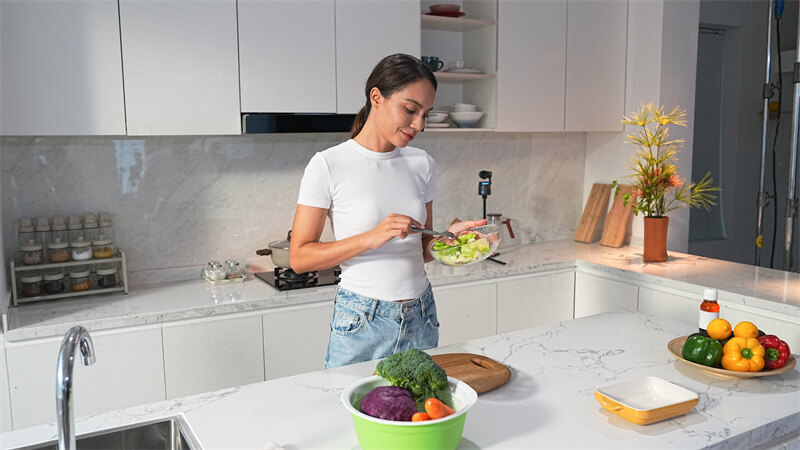The 9 Best 4K Video Cameras for Creators in 2025

Shooting top-notch video requires the right gear. A 4K video camera offers the clarity and control needed to bring your vision to life. With so many new models in the market offering 60fps recording, wide dynamic range, and compact, creator-friendly designs, it is easier than ever to find something tailored to your style.
In this article, we break down the best options on the market to help you choose the right 4K video camera for your workflow.
Part 1: How to Choose the Right 4K Video Camera?
- Understand Your Purpose: Match your camera to your main content style, which may include vlogs, action shots, or travel.
- Balance Your Budget: Consider the full cost of gear, including lenses and audio, not just the camera body.
- Consider Image Quality and Sensor Size: A good 4K video camera should offer a sharp sensor; larger sensors give better low-light and cinematic depth.
- Check Portability & Form Factor: Compact setups are ideal for travel or solo creators, while bulkier rigs suit studio filming.
- Verify Audio & Connectivity Options: Ensure the camera supports mic input, headphone monitoring, and clean HDMI or SDI out.
Part 2: The 9 Best 4K Video Cameras for Creators
Top Picks - Best Overall for Most Creators
1. OBSBOT Tail 2 Live Production Camera
If you're a creator looking for high-quality 4K output without bulky gear or setup delays, the OBSBOT Tail 2 is built to simplify the process. It captures vibrant, cinematic 4K footage that looks polished straight out of the camera. With excellent low-light handling and intuitive controls, it helps you stay agile and focused on storytelling, not technical tweaks. Whether you're shooting a vlog, a hands-on tutorial, or a studio piece, it handles framing, motion, and detail effortlessly — so you can stay focused on the story, not the setup.
Price: $1199
Key Features:
- 4K 60fps Video Shooting: It captures vibrant, cinematic 4K footage that looks polished straight out of the camera.
- Professional Framing with Auto Zoom: Uses 5x optical zoom & 12x hybrid zoom to keep subjects perfectly framed with high-quality close-ups and wide shots in 4K resolution.
- Two Native ISO Ranges: With Dual Native ISO tech integrated, every frame captured by Tail 2 would be well balanced automatically.
- AI-Tracking 2.0: Provides highly accurate subject tracking that keeps the subject sharply in frame, ensuring dynamic shots stay professional and focused.
2. Canon EOS R8

The Canon EOS R8 is designed for creators who want cinematic depth and full-frame quality in a lightweight package. Whether you're filming content indoors or on the move, its image output is rich and sharp, making it ideal for interviews, travel scenes, or creative storytelling that demands clarity and flexibility.
Price: $1399 (Body Only)
Key Features:
- Full-Frame 4K60 Sensor: Captures high-resolution video with shallow depth of field.
- 10-Bit HDR Recording: Produces more lifelike color and detail, even in contrast-heavy scenes.
- Compact Form Factor: Lightweight enough for travel, with advanced features for pro content.
- Eye and Subject Detection AF: Keeps focus locked on faces or fast-moving objects.
- Vari-Angle Touchscreen: Makes framing easy whether you're behind or in front of the camera.
3. DJI Osmo Pocket 3

If you're a fast-moving solo creator, the DJI Osmo Pocket 3 offers a practical way to shoot sharp 4K video without the bulk. It's compact, easy to stabilize, and delivers consistent output for daily vlogging, b-roll, and travel clips. This camera is particularly handy for creators who value quick setup and clean handheld shots that still look professional.
Price: $799
Key Features:
- Pocket-Sized Convenience: Compact enough to fit in your palm and great for travel or daily carry.
- 3-Axis Stabilization: Ensures ultra-smooth video, even during movement or handheld shooting.
- 10-Bit Color Profiles: Offers greater color depth for cinematic grading flexibility.
- Stereo Audio Recording: Captures rich sound for clearer narration and ambient details.
- Smart Autofocus & Subject Tracking: Locks onto your subject with minimal setup time.
Budget & Travel-friendly
4. Sony ZV‑E10

For creators starting out or growing a channel, the Sony ZV-E10 is a flexible 4K camera built for everyday use. This Sony 4K camera is lightweight and optimized for shooting product demos, interviews, and sit-down content, with tools that help you focus on storytelling and not technical setup.
Price: $749.99 (body only)
Key Features:
- 24.2MP APS-C Sensor: Provides high-resolution footage with natural depth.
- Directional Microphone: Captures clear voice audio with reduced background noise.
- Product Showcase Mode: Instantly shifts focus between your face and product close-ups.
- Flip-Out Touchscreen: Perfect for selfie-style recording or live streaming.
- Fast Hybrid Autofocus: Tracks subjects accurately for minimal re-shoots.
5. GoPro HERO12 Black

For outdoor, sports, or action-oriented creators, the GoPro HERO12 Black makes high-quality 4K content possible in the toughest conditions. Whether you’re capturing rapid movement, time-lapses, or underwater footage, it's a compact solution that delivers sharp visuals and extreme durability.
Price: $369
Key Features:
- 4K120 & 5.3K60 Recording: Delivers ultra-detailed slow-motion and high-res action.
- Hyper Smooth Stabilization: Keeps footage steady in the roughest conditions.
- Waterproof to 10m: No need for extra housing and great for surf, snow, or rain shots.
- TimeWarp 3.0: Easily create dynamic hyperlapse videos.
- Voice Control: Operate hands-free in fast-paced environments.
6. Fujifilm X-M5

The Fujifilm X-M5 brings professional-grade 4K footage with color science that creators love. Perfect for hybrid content (mixing video with stills), this 4K videography camera caters to lifestyle, beauty, and narrative creators who want elegant footage without relying heavily on post-production.
Price: $799 (body only)
Key Features:
- In-Body Stabilization (IBIS): Delivers shake-free footage even without a gimbal.
- X-Trans CMOS Sensor: Renders sharp images with Fujifilm's renowned color accuracy.
- Film Simulation Modes: Let you stylize footage in-camera without heavy editing.
- Long Battery Life: Shoot longer sessions without midday charging breaks.
- USB-C Video Output: Direct connection to Windows machines for streaming or file transfer.
Pro-Level Choices
7. Sony FX3A

A favorite for serious filmmakers, the Sony FX3A is built for cinematic 4K performance with minimal setup. From interviews to high-production YouTube content, it offers pro-level color control, audio inputs, and internal cooling, minus the traditional bulk of cinema gear.
Price: $3899
Key Features:
- Full-Frame 4K120 Video: Offers crisp, slow-motion capture with high dynamic range.
- Fan-Cooled Body: Supports long recording sessions without overheating.
- Professional Audio Interface: Includes XLR support and top-handle mic input.
- Dual Card Slots: Adds backup and extended storage flexibility.
- S-Cinetone Color Profile: Produces rich cinematic tones with minimal grading.
8. Canon EOS R5 C

Hybrid creators will appreciate the Canon EOS R5 C for its 8K recording and high-end photo capabilities. Whether you're capturing full-length cinematic scenes or crisp B-roll, it provides unmatched flexibility and reliability in high-pressure shoots.
Price: $3399
Key Features:
- 8K RAW Video Recording: Enables ultra-detailed footage with incredible post flexibility.
- Dual Operating Modes: Switch seamlessly between photo and video UI.
- Unlimited Recording Time: Ideal for long events or live shoots.
- Dual Memory Card Slots: Separate storage for safety and workflow efficiency.
- Active Cooling System: Maintains performance even during long 8K sessions.
9. Panasonic Lumix GH6
The Panasonic Lumix GH6 is engineered for long-form content creators who need extended recording time, robust stabilization, and professional codecs. Great for documentaries, music videos, and tutorials, it blends portability with deep control for serious 4K workflows.

Price: $2199
Key Features:
- 5.7K and 4K 120p Video: Delivers both high-res detail and silky slow-motion.
- Unlimited 10-Bit Internal Recording: Shoot long takes without format compromises.
- Apple ProRes Support: Reduces editing time and maintains quality.
- Robust IBIS System: Stabilizes handheld footage even with longer lenses.
- Dual Card Slots: Ensures continuous shooting and easy backup options.
Part 3: FAQs about 4K Video Camera
1. What is the best camera for 4K video?
If you're looking for a reliable and compact option that balances quality with ease of use, the OBSBOT Tail 2 stands out. It's well-suited for creators who want 4K 60fps performance, smooth stabilization, and flexible framing in one device.
2. What are the disadvantages of 4K cameras?
While 4K video cameras deliver sharper visuals, they come with trade-offs, such as larger file sizes, higher hardware requirements for editing, and faster battery drain. You’ll also need high-speed storage and memory cards to keep up with the data rate.
3. How many megapixels are needed for 4K video?
4. Can people tell the difference between 2K and 4K?
In many cases, yes, especially on larger screens or when zooming or cropping footage. 4K video provides more detail and flexibility in post-production, making it the preferred format.
Conclusion
Choosing the right 4K video camera comes down to understanding your creative needs, whether you're filming dynamic action scenes, studio interviews, or travel vlogs. Prioritize features that match your workflow: resolution, stabilization, connectivity, and lens compatibility. With the right gear, even solo creators can produce cinematic content that stands out.
